fundamental data types: stacks and queues
operations:
insert, remove, test empy, iterate,...

module programming: seperate interface and implementation
1. Stacks
ex. a stack of strings
-
API:
public interface StackoOfStrings{ void push(String item); String pop(); boolean isEmpty(); //int size(); }
implementation 1: using a linkedlist
insert/remove from the top of the linkedlist
-
inner class
class ListNode{ String item; ListNode next; }
-
implementation
public class LinkedStackOfStrings implements StackoOfStrings{ class Node{ String item; Node next; Node(String item, ListNode nxt){...} } private Node first; public LinkedStackOfStrings(){ first = null; } public void push(String item){ Node nd = new Node(item,first); first = nd; } public String pop(){ String firstItem = first.item; first = first.next; return firstItem; } public boolean isEmpty(){ return first==null; } }
-
complexity: const time for every operation
array implementation
- use array (of length N) to store items → defect: stack has limited capacity
-
keep a pointer *top: *pointing to the next empty space to push (top 的定义很重要)
-
problems of the array implementation:
- underflow: pop from an empty stack
- overflow: size larger than capacity ⇒ resizing
-
loitering: holding a ref to an obj which is no longer needed: ex.
return s[top--]java system will not know that s[top] is no longer needed ⇒ have to clear it explicitely ⇒String item = s[top--]; s[top]=null; return item
-
implementation (containg resizing array operations)
public class ArrayStackOfStrings implements StackOfStrings{ private String[] s; private int top=0; public ArrayStackOfStrings(){// to be tuned s = new String[1];//initial capacity=1 } public boolean isEmpty(){ return top==0; } private vois resize(int capacity){//helper functoin String[] s2 = new String[capacity]; for(int i=0;i<top;i++) s2 = s[i]; s = s2; } public void push(String item){ if(top==s.length)//doubling size resize(s.lenth*2); s[top++]=item; } public String pop(){ String item = s[--top];//NOT top--! s[top]=null; if(top>0 && top==s.length/4) //top>0 is necessary resize(s.length/2); return item; } }
2. Resizing Arrays
resolving the overflow pb: grow and shrink the array → need to copy all items when changing array size ⇒ pb: ensure that sizing happens infrequently
resizing strategy
- repeated doubling:
(initial capacity=1) when array is full, double the size
- amortized complexity for inserting N:
N+(2+4+8+...+N) ~3N
- shrinking array
⇒ shrink the array by half when array is 1/4 full
not half full → thrashing will happen if push-pop-push-pop when array is full
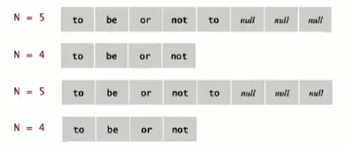
- [invariant]: array always 20%~100% full
- complexity:
in an amortized sense, will be constant
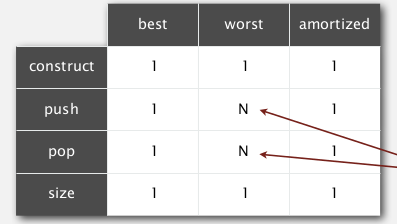
proposition: from empty stack, M operations of push/pop taked time propotional to M
comparison: resizable array vs linkedlist
- linkedlist implementation:
operations takes const time even in worst time extra time and space for dealing with linkes
- resizing array implementation:
operation taked const amortized time but in worst case takes linear time (ex. to be evited for critical systems) less wasted space
3. Queues
FIFO data structure API
public interface QueueOfStrings{
void enqueue(String item);
String dequeue();
boolean isEmpty();
//int size();
}
linked list implementation
maintain first and last node pointers:
pointing to 2 points of queue (first for dequeue, last for enqueue )

→ take care of corner cases:
- empty queue: first is null (and last is also null)
- just one item in queue: first and last point to the same node
(总之first和last的定义很重要)
public class LinkedQueueOfStrings implements QueueOfStrings{
class Node{... }
private Node first,last;
public LinkedQueueOfStrings(){
first = null;
}
public void enqueue(String item){//same as push
Node nd = new Node(item,null);
if(isEmpty()){
last = nd;
first = last;
}
else{
last.next = nd;
last = nd;
}
}
public String dequeue(){//same as pop in stack
String firstItem = first.item;
first = first.next;
if(isEmpty())
last=null;
return firstItem;
}
public boolean isEmpty(){
return first==null;
}
}
resizing array implementation
maintain head and tail:
head is the queue head, tail is the next empty position for the next element to enqueue
→ trick: head and tail should take mod capacity + resizing array

不知道写的对不对:
public class ArrayQueueOfStrings implements QueueOfStrings{
private String[] q;
private head=0,tail=0;
public LinkedQueueOfStrings(){
q = new String[1];//init capacity
}
public boolean isEmpty(){
return head==tail;
}
private void resize(newsz){
q2 = new String[newsz];
int i = head,j=0;
while(i!=tail){
q2[j++] = q[i];
i=(i+1)%q.length;
}
q = q2;
head=0;
tail=j;
}
public void enqueue(String item){
if( (tail+1)%q.length==head )
resize(q.length*2);
q[tail] = item;
tail = (tail+1)%q.length;
}
public String dequeue(){
String firstItem = q[head];
head = (head+1)%q.length;
int sz = (tail-head)%q.length;
if(sz>0 && sz==q.length/4)
resize(s.length/2);
return firstItem;
}
}
4. Generics
queues/stacks for other types of data ⇒ generics 泛型(java 1.5 才引进泛型机制...) use type paramater→ avoid casting, and discover type mismatch errors at compile time
public interface Stack<Item>{
public void push(Item item);
public Item pop();
public boolean isEmpty();
}
a pb with array implementation
java不支持创立泛型数组
generic array creation is not allowed. 不可以new 一个泛型数组!
s = new Item[capacity];会报错
⇒ use an ugly cast:
s = (Item[]) new Object[capacity];
(will get warning: "unchecked cast" → java被黑了... )
autoboxing for primitive types
each primitive type has a wrapper class
ex. int ↔ Integer
autoboxing: automatic cast between a primitive type and its wrapper class.

(syntactic sugar 语法糖 i.e. 对语言功能没有影响只是方便使用)
btw: https://zh.wikipedia.org/wiki/%E8%AF%AD%E6%B3%95%E7%B3%96 (居然还有语法盐和语法糖精......)
5. Iterators
Interface
support iteration over stacks and queues, without revealing the internal representation of stack/queue
⇒ implement the Iterable interface
-
Iterableinterface: can return an *Iterator *public interface Iterable{ Iterator<Item> iterator(); }
-
Iterator interface: hasNext() and next() interface
public interface Iterator<Item>{ boolean hasNext(); Item next(); void remove();//optional, bad practice to use it }
-
to make a data structure Interable → elegant client code

how-to:
- implement
Iterableinterface - write a private inner class XXIterator that implment the
Iteratorinterface.
ex.
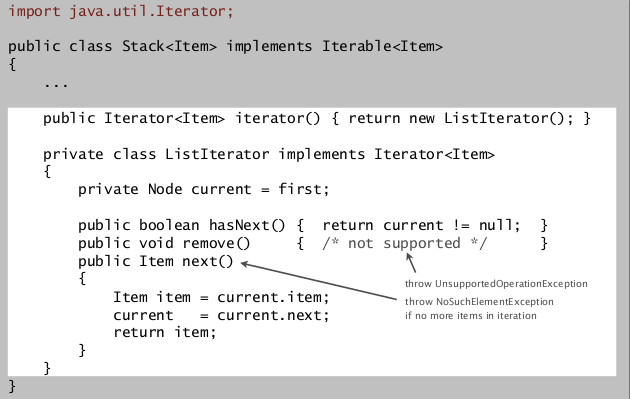
Bag data structure
Supports adding and iterating through without caring about the order.
API:
public class<Item> Bag implements Iterable<Item>{
public void add(Item);
int size();
}
can be implemented by stack or queue(without pop/dequeue)
6. Applications
Java collections library
List interface: java.util.List
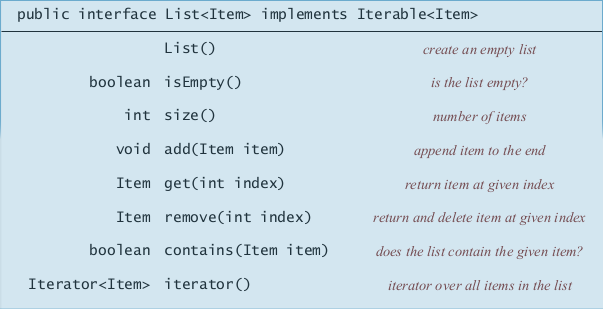
implementations: ArrayList, LinkedList.
- pb with the java's implementation of stacks and queues:
Stack class also implements List interface (get(), remove(), contains() are implemented);
Queue is an interface rather than a class...
⇒ poorly designed API
Stacks applications
- function calls:

recursion: can always use an explicit stack to remove recursion
- arithemic evaluation (Dijkstra)
四种类型: 左括号, 右括号, 数字, 算子
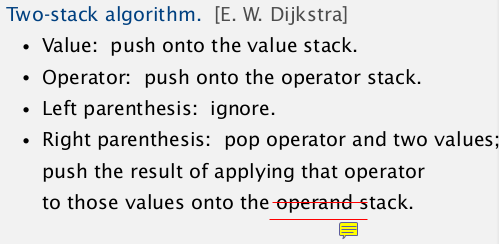
最后一行应该是value stack.
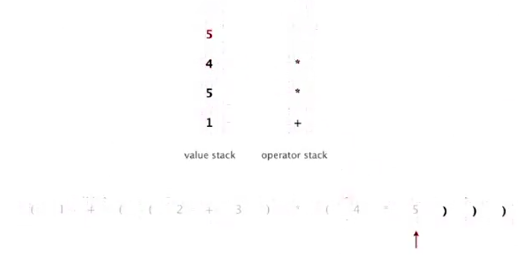
⇒ 后缀表达式, 逆波兰式......
Part 4 of series «Algorithms Princeton MOOC I»:
- [Algorithms I] Week 1-1 Union-Find
- [Algorithms I] Week 1-2 Analysis of Algorithms
- [Algorithms I] Week1-Lab: Percolation
- [Algorithms I] Week 2-1 Stacks and Queues
- [Algorithms I] Week 2-2 Elementary Sorts
- [Algorithms I] Week 3-1 Mergesort
- [Algorithms I] Week 3-2 Quicksort
- [Algorithms I] Week 4-1 Priority Queue
- [Algorithms I] Week 4-2a Elementry Symbol Tables
- [Algorithms I] Week 4-2b Binary Search Trees
- [Algorithms I] Week 5-1 Balanced Search Trees
- [Algorithms I] Week 5-2 Geometric Applications of BSTs
- [Algorithms I] Week 6 Hash Tables
Disqus 留言